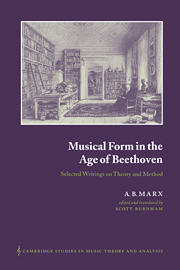Book contents
- Frontmatter
- Contents
- Foreword
- Preface
- Introduction: Music and Spirit
- PART I MUSIC THEORY AS EDUCATION OF THE SPIRIT
- 1 The Old School of Music in Conflict with our Times: selected excerpts
- 2 A Practical and Theoretical Method of Musical Composition, vol. I: selected excerpts
- PART II MARX'S FORMENLEHRE IN THEORY AND APPLICATION
- Part III HERMENEUTIC ANALYSIS AND THE IDEE
- Select bibliography
- Index
1 - The Old School of Music in Conflict with our Times: selected excerpts
Published online by Cambridge University Press: 03 December 2009
- Frontmatter
- Contents
- Foreword
- Preface
- Introduction: Music and Spirit
- PART I MUSIC THEORY AS EDUCATION OF THE SPIRIT
- 1 The Old School of Music in Conflict with our Times: selected excerpts
- 2 A Practical and Theoretical Method of Musical Composition, vol. I: selected excerpts
- PART II MARX'S FORMENLEHRE IN THEORY AND APPLICATION
- Part III HERMENEUTIC ANALYSIS AND THE IDEE
- Select bibliography
- Index
Summary
Marx wrote his polemical monograph The Old School of Music in Conflict with our Times before all four volumes of his compositional method had yet appeared but after the first two volumes had been successful enough to warrant second editions. The monograph is both a defense of his own compositional method and an attack on the recently published harmony treatise of another Berlin music theorist, Siegfried Wilhelm Dehn. Marx felt he was effecting a revolution in music pedagogy by uniting the traditional divisions of music study, namely melody, rhythm, harmony, and form. He argued that such a union reflects both the unity of the musical artwork and of the unified powers of the student. Dehn, on the other hand, maintained the old divisions and thus drew Marx's fire.
In 1842 Marx's monograph received a spirited response – not from Dehn, but from Gottfried Wilhelm Fink, who lectured on music at the University of Leipzig and was editor-in-chief of the Leipzig allgemeine musikalische Zeitung from 1828 to 1841. The debate between Marx and Fink is of great interest and is in fact the subject of an entire monograph by Kurt-Erich Eicke. Much can be learned about the state of instruction in composition and the philosophy of music theory and pedagogy from Marx's critique of Dehn and from Fink's counterattack. Our concern in selecting the following excerpts, however, is with the ambitious programmatic goal Marx sets for the compositional method of the future and how he feels he has met that challenge.
- Type
- Chapter
- Information
- Musical Form in the Age of BeethovenSelected Writings on Theory and Method, pp. 17 - 34Publisher: Cambridge University PressPrint publication year: 1997
- 1
- Cited by

